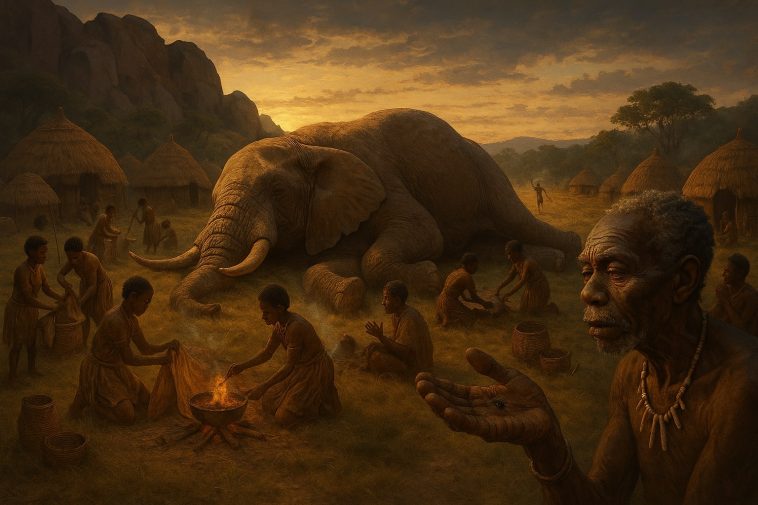In the time before time, when the Great Spirit still walked among us, the Amani people lived between the whispering trees of the Ituri Forest and the endless golden expanse of the grasslands. Life was a dance with nature—a rhythm of hunt and harvest, of dry seasons and bountiful rains. But there were times, my children, when the belly of the village rumbled with an emptiness that no small game could fill. It was in such a time that the shadow of the Nzogu—the elephant—loomed largest in their thoughts.
The Nzogu was a walking mountain, a spirit of the land, powerful beyond measure. To face it head-on was madness, a foolish dance with death. Many young, hot-blooded warriors had tried, their spears bouncing off hide thick as ancient tree bark, their courage swallowed by its thunderous charge. But the Amani were not foolish. They were wise. They remembered the words of the First Ancestor: “The river carves the canyon, not by force, but by persistence. The ant fells the Nzogu, not by might, but by knowing where to bite.”
One dry season, the dust devils danced across the plains, and the game had scattered. The children cried with hunger, and the elders looked to the horizon with worry etched deep in their faces. It was then that Chief Juma, a man whose wisdom was as deep as the Great Lake, called a council. “We need the Nzogu,” he declared, his voice low but firm. A collective gasp rippled through the gathered warriors. “But how, Chief?” asked young Kaelo, his hand instinctively reaching for his spear. “How do we fell a mountain?”
Chief Juma smiled, a slow, knowing smile that crinkled the corners of his eyes. “We do not fell the mountain, my son. We become the ants.”
The plan was not of brute force, but of relentless patience and cunning. They would not charge the Nzogu. Instead, they would study it. For days, the most agile hunters, led by the silent, swift tracker, Mwamba, followed a lone bull elephant. They learned its paths to the watering hole, its favorite grazing spots, its sleeping habits. They observed its slight limp, a weakness in its left foreleg from an old injury. This was the “spot.”
Under the cloak of night, the Amani began their work. Not with spears, but with tools of the earth. They dug shallow, wide depressions along the elephant’s most frequented path, disguising them with branches and leaves. These were not pits to trap, but to annoy, to subtly shift its weight, to exacerbate its existing limp. They poisoned the tips of tiny, hair-thin thorns with a slow-acting sap from the Muti wa Sumu tree, a sap that would cause a deep, persistent ache, not instant death.
Then came the hunt. It was not a charge, but a relentless, strategic harassment. A small group of warriors, swift as gazelles, would dart in, pricking the Nzogu’s legs with the poisoned thorns, aiming for the tender spots around its hooves and the joints of its injured leg. The elephant would bellow, charge, and they would melt into the tall grass, only to reappear minutes later, from another direction, another prick. This continued, for a day and a night. The Nzogu, mighty as it was, grew weary. Its limping leg ached, the tiny pricks festered with a dull, throbbing pain. It was confused, enraged, but slowly, inexorably, it was being worn down by a thousand tiny stings.
Finally, driven by the relentless “ants,” the Nzogu stumbled into a natural ravine, a deep gully hidden by thick bush, that the Amani had subtly guided it towards. Its injured leg gave way, and with a mournful cry that shook the very ground, the giant fell. It was not a heroic duel, but a testament to collective intelligence and unwavering patience. The ants had chosen their spot, and the elephant had fallen.
The celebration was brief, for the task was immense. The Nzogu was too vast, too heavy, to carry back to the village. So, a young, swift runner, little Pendo, was dispatched. He ran like the wind, his heart bursting with the news, until he reached the village. “The Nzogu has fallen!” he cried, his voice hoarse but triumphant.
And then, a sight to behold! The entire Amani village, young and old, women with babies strapped to their backs, children clutching their parents’ hands, began the migration. They packed their meager belongings, extinguished their hearths, and followed Pendo back to the kill site. It was a journey of joy and anticipation, a grand procession under the vast African sky.
For days, they camped beside the fallen giant. Fires blazed, meat was roasted, and the air was thick with the scent of bounty. Stories were told, songs were sung, and the wisdom of the elders was shared around the communal fires. Every part of the Nzogu was honored and utilized—its meat for sustenance, its hide for shelter and tools, its bones for implements, its tusks for trade and ceremony. It was a time of abundance, of community, and of profound gratitude. They ate until their bellies were full, until the last morsel was consumed, leaving only the bones picked clean by the scavengers, a testament to life’s cycle.
This, my children, is the lesson. The Nzogu did not fall because of one mighty warrior, but because of the collective wisdom, the patience, and the persistent, strategic effort of many. It teaches us that even the smallest among us, working together, can overcome the greatest challenges. It teaches us that true strength lies not just in muscle, but in mind, in unity, and in knowing where to place your efforts. The ant, seemingly insignificant, can bring down the mightiest beast if it understands its target.
And so, as you walk your own paths in this new world, remember the Amani. Remember the Nzogu. Remember that the collective memory of our family, our tribe, our people, is our greatest strength. It is a tapestry woven with the threads of these very stories, of our triumphs and our lessons. Do not let these threads unravel. Hold them close, share them, and ensure that the whispers of Old Man Kwesi and the wisdom of the Amani continue to echo for generations yet to come. For in these stories, our history lives, our values endure, and our future is shaped.
This post was created with our nice and easy submission form. Create your post!










The Nzogu was poisoned by the sap and spears, yet the village ate its meat. That wasn’t a smart move. Elders should have caught it.